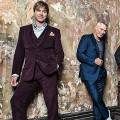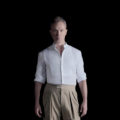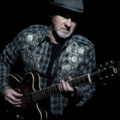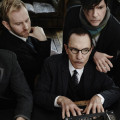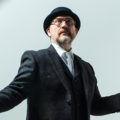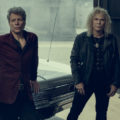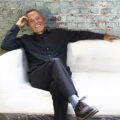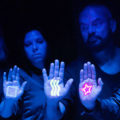Martin Fry shoots that “Poison Arrow” towards ABC’s anniversary for “The Lexicon Of Love”
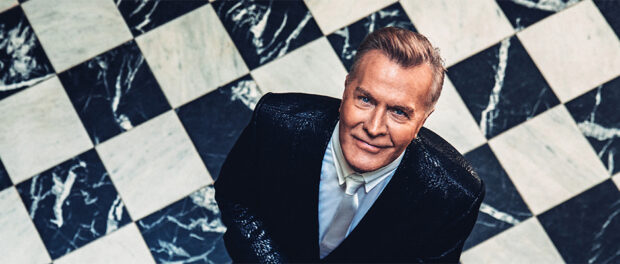 Photos provided by Paradise Artists
Photos provided by Paradise Artists
No act of the 1980s embodied slick pop sophistication more than ABC, who’s original front man Martin Fry is still leading the band with a voice dipped in buttery soul and some of the sharpest, sparkling suits imaginable.
Midwest music lovers have two chances to catch the suave singer and the rest of the English group, including a stop at Milwaukee’s Summerfest on Friday, July 8 and the Des Plaines Theatre on Saturday, July 9, both of which will celebrate the 40th anniversary of their breakout debut album, “The Lexicon Of Love.”
In advance of those occasions, Fry connected with Chicago Concert Reviews to discuss the project’s ubiquitous singles, “The Look Of Love” and “Poison Arrow,” his deep reverence for the local house scene, getting personal stamps of approval from David Bowie, Smokey Robinson and Stevie Wonder, along with a massive movie moment that got away.
Does it feel like it’s been 40 years since “The Lexicon Of Love” came out?
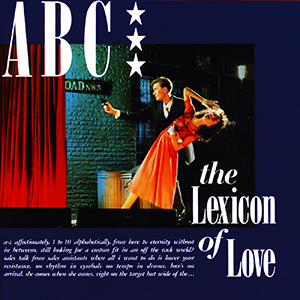 Martin Fry: No way. Somebody said to me it was 40 years and I did not believe them. They said it was a good idea to go out and tour the 40th anniversary. It just feels like yesterday, and funny enough, when we’re up on stage playing “All Of My Heart,” “Poison Arrow” and “The Look Of Love,” it feels nice and fresh. It’s nice to celebrate something like that because a lot of records have come out in the subsequent period. But for people who remember those songs, that’s a great feeling.
Martin Fry: No way. Somebody said to me it was 40 years and I did not believe them. They said it was a good idea to go out and tour the 40th anniversary. It just feels like yesterday, and funny enough, when we’re up on stage playing “All Of My Heart,” “Poison Arrow” and “The Look Of Love,” it feels nice and fresh. It’s nice to celebrate something like that because a lot of records have come out in the subsequent period. But for people who remember those songs, that’s a great feeling.
Why do you think the material still holds up?
Fry: A couple of things really. I think a lot of the ‘80s music [has held up because] it was a very experimental time and there was a lot of new equipment coming through. Synthesizers and beatboxes were all brand new. Now you can do pretty much everything on your phone. It’s the digital age we live in now, but back then, there was a lot of experimentation and forward thinking. When you listen to an artist like The Weeknd, he’s influenced by some of the elements that were around back in the day. The public are kind of attuned to that feeling of melodies and big choruses. Originally, we came out of the punk rock era and we wanted to make music that was a fresh mixture of dance music and pop. I think those flavors are in the air now, so in a way, that suits us when people hear our music.
Can you dive into what it was like making “The Look Of Love”?
Fry: When we were recording, Tony Visconti had the studio and David Bowie came down to the recording session. We were just this fledging band from Sheffield making our record, “The Look Of Love,” and he sat in on the session and made a few suggestions. In my mind, I think he sprinkled a bit of his magic dust, his “Ziggy Stardust” onto us. It definitely enhanced the whole experience when you first start out. Making a record is a very exciting thing, but for us to have met Bowie in that period, it was also very exciting. I think he definitely helped it on our way. In the song, we have two breaks. We didn’t want to put a sax solo in, so he suggested that I keep putting in messages on an answering machine for somebody who wouldn’t pick up for me. In the end, I did a little speech, “Martin, maybe one day you’ll find true love,” which has haunted me ever since. But that was inspired by a record he made with Iggy Pop called “Turn Blue.” It’s a great record. I always liked it when James Brown would start talking midway through a record. It’s a great tradition where the lead singer just kind of talks to themselves. “The Look Of Love” is probably our most popular song and every act needs a song like that. It’s a wonderful feeling to play it live.
Do you ever get tired of singing it?
Fry: No. Once a day’s enough for me. Sometimes twice a day.
“Poison Arrow” ranks right up there. What types of reactions have you received?
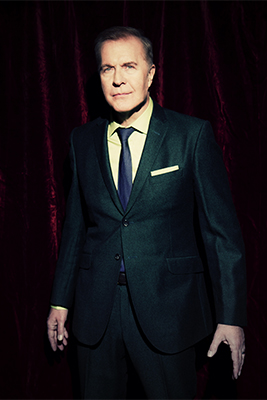 Fry: Believe me, as the years roll by, people do say the strangest things. I’m not gonna quote them to you cause they say, “I met my first wife” or “I did this” and “I did that.” There’s some pretty vivid images they portray to you. People have very moving and sentimental stories, and memories around music. It’s stunning, and you feel that when you’re on stage and you look out into the audience. Sometimes there’s a very emotional connection to the music. With “Poison Arrow,” it’s a song about unrequited love, so fortunately for me, there are many people in the world who’ve also shared that same experience. They really have fancied somebody and they didn’t fancy them. That’s served me well in that song. “Who broke my heart?” “You did, you did.” “Bow to the target, blame Cupid, Cupid.” Universal things I think.
Fry: Believe me, as the years roll by, people do say the strangest things. I’m not gonna quote them to you cause they say, “I met my first wife” or “I did this” and “I did that.” There’s some pretty vivid images they portray to you. People have very moving and sentimental stories, and memories around music. It’s stunning, and you feel that when you’re on stage and you look out into the audience. Sometimes there’s a very emotional connection to the music. With “Poison Arrow,” it’s a song about unrequited love, so fortunately for me, there are many people in the world who’ve also shared that same experience. They really have fancied somebody and they didn’t fancy them. That’s served me well in that song. “Who broke my heart?” “You did, you did.” “Bow to the target, blame Cupid, Cupid.” Universal things I think.
What’s the format of these anniversary concerts?
Fry: We’re doing a whole collection of the ABC catalogue, so we don’t play the whole of “The Lexicon,” but we play a substantial part of it with a six-piece band. It’s a really good band. We always get to play “When Smokey Sings” and “Be Near Me,” which was a big hit for us here. It’s a song we don’t really play much in Europe, so it’s great to come over here, and play a different set in the U.S.A. and North America…We’re gonna play a couple of songs off “The Lexicon Of Love II”: “The Flames Of Desire” and “Viva Love.” We’re looking forward to debuting that material in Illinois. It’s just our favorite stuff really, and also, it’s about entertaining the audience, trying to take them higher and mixing it up.
Do you have any memories of visiting the Chicagoland area?
Fry: I love the Chicago house sound. [Former member] Mark White and myself worked with Derrick May from Detroit, but we also worked with Frankie Knuckles back in 1988-89, who’s obviously incredible, God bless him, as a Chicago DJ and one of the early exponents of house music. In Britain, house music is massive. It’s still very popular. Likewise, we recorded in the suburbs at Steve “Silk” Hurley’s studio and they were great memories.
When I came again with my kids, we did a bike ride. Obviously as tourists, you get to see where [President Barack] Obama met Michelle at the university and you get taken around the Japanese Gardens, but for me, going to where some of the house music records [were made] and where some of the house parties took place, that’s an international grand! Those are the places I’ll be going. If the weather’s good, I’ll jump on a bike and have a little sprint around, but I’m slower on the bike these days.
Historically, Chicago is a great cross section in music between the South and the North I suppose, but for me, it’s about house music. We made some records close to that sound in the ‘80s. We love that sound. Also, Marshall Jefferson’s from Chicago. I still love his productions. There’s somebody else I met from Chicago, Hawk Wolinski, the guy from Rufus. He helped us on “(How To Be A) Millionaire.” We even played in the zoo once. That was a wonderful evening. [The Smiths’] Johnny Marr came down to watch the show.
ABC is quite unique in that you’re not just a pop or rock band, but also incorporate soul, house and so much more. How did you arrive at that cross section?
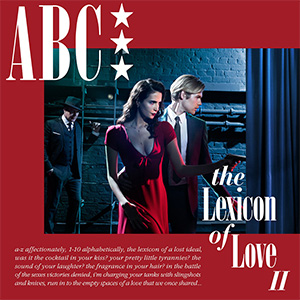 Fry: I grew up going to clubs when I was a teenager, at 14 or 15, lying about my age to get in. I always loved it. In Britain at least, there were lots of different subcultures and different groups of people. I remember hearing “Family Affair” by Sly And The Family Stone when I was really young. They played it and everybody danced to it. And I always loved the Chic productions years later. I love it when a record just captures everybody’s mood and I think that’s why I’ve always liked dance music. But I come from a tradition of songwriting as well, like The Beatles and The [Rolling] Stones did. They took different influences and you just make it into your own sound. That’s definitely what we tried to do, listening to Motown, Chess and Stax, alongside David Bowie, Bryan Ferry and the glam rockers. That is definitely woven into our fabric. We’ve never been a straight out and out rock band ever. We can rock out and we’ve made some guitar-based records, but we’ve never really been that. We’ve always been about trying to fuse different worlds together. With [the album] “How To Be A … Zillionaire!,” it was a full electronic, before EDM, and it’s nice when, years later, I meet people from many different genres and they say, “I really enjoyed that record.” We made and [the single] “Millionaire” and “Be Near Me” with Keith LeBlanc, who played with Grandmaster Flash and was a programmer. It’s nice mixing up different styles.
Fry: I grew up going to clubs when I was a teenager, at 14 or 15, lying about my age to get in. I always loved it. In Britain at least, there were lots of different subcultures and different groups of people. I remember hearing “Family Affair” by Sly And The Family Stone when I was really young. They played it and everybody danced to it. And I always loved the Chic productions years later. I love it when a record just captures everybody’s mood and I think that’s why I’ve always liked dance music. But I come from a tradition of songwriting as well, like The Beatles and The [Rolling] Stones did. They took different influences and you just make it into your own sound. That’s definitely what we tried to do, listening to Motown, Chess and Stax, alongside David Bowie, Bryan Ferry and the glam rockers. That is definitely woven into our fabric. We’ve never been a straight out and out rock band ever. We can rock out and we’ve made some guitar-based records, but we’ve never really been that. We’ve always been about trying to fuse different worlds together. With [the album] “How To Be A … Zillionaire!,” it was a full electronic, before EDM, and it’s nice when, years later, I meet people from many different genres and they say, “I really enjoyed that record.” We made and [the single] “Millionaire” and “Be Near Me” with Keith LeBlanc, who played with Grandmaster Flash and was a programmer. It’s nice mixing up different styles.
Much of that music was of course made in the 1980s. At what point during that period did you feel you truly made it?
Fry: When we first came to America, we did a show in L.A. in a tiny club and somebody said, “Stevie Wonder is coming down here to see you play.” Now we’re just a bunch of guys from Sheffield and Stevie Wonder came backstage with his entourage and said, “oh yeah, we play ‘The Look Of Love’ on my local radio station.” I didn’t realize he meant he owned the radio station, KJLH: joy, love and happiness. That was a trip to be able to meet somebody face to face that you admired for long and he’s talking to you about your music. You can’t really buy that and that’s definitely the best part of the adventure of being a musician.
What are your thoughts on ABC winding down in the 1990s, taking time off and then starting up again in the 2000s?
Fry: I’ve been around for a while, right? What you don’t really know when you’re young is there are times when your music is completely out of sync with the public taste. It seemed like nobody’s interested. So the ‘90s for me was definitely about going back, like when we were kids, I’d go and build flat-pack furniture in IKEA and it was very different from traveling the world in a band. But it was really good. It was great to step off after ten years of really going for it and just do something completely different. The funny thing is, you think nobody is gonna be interested, but a few years roll by, and this must have happened to anybody that’s been around for more than five minutes. People look at you again and they don’t say, “why are you here?” They go “you are a legend. It’s great to hear your music. You represent a moment in time.” So you get the chance again to go out and play as an elder statesman. It’s up to you at that point, if you’re up for it, to go for it, so it’s very much like a merry-go-round.
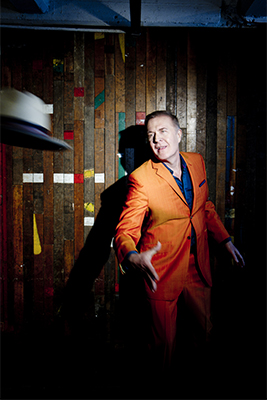 If you’re asking me if I would go to a time and change one thing, I had to laugh recently because I was watching “Top Gun: Maverick.” I remember when Mark White and myself were invited down to see a rough cut of a film that was all about air pilots fighting. Tom Cruise was in it and they embedded music by Blondie and others in it. They said, “we’d really like some of your music,” and we went out into the car park and said, “nobody’s ever going to be interested in this. It’s just too jingoistic man!” Of course, that film was “Top Gun” (laughs) and it was kind of the biggest! If we’re going back in the time machine, I’m going back to that time. “Yeah, we’ve got a tune for you!” That is the beautiful thing about having a career. The mistakes you make and the blind alleys you go down are just as exciting as the good stuff and the successful moments.
If you’re asking me if I would go to a time and change one thing, I had to laugh recently because I was watching “Top Gun: Maverick.” I remember when Mark White and myself were invited down to see a rough cut of a film that was all about air pilots fighting. Tom Cruise was in it and they embedded music by Blondie and others in it. They said, “we’d really like some of your music,” and we went out into the car park and said, “nobody’s ever going to be interested in this. It’s just too jingoistic man!” Of course, that film was “Top Gun” (laughs) and it was kind of the biggest! If we’re going back in the time machine, I’m going back to that time. “Yeah, we’ve got a tune for you!” That is the beautiful thing about having a career. The mistakes you make and the blind alleys you go down are just as exciting as the good stuff and the successful moments.
How about a moment you got just right?
Fry: I had a tough period before we were out with “When Smokey Sings.” I would sit at home recuperating from an illness and I would listen to Motown: Marvin Gaye, Stevie Wonder, The Temptations, Smokey Robinson. The record came out and then the first TV show we did was in Holland. I walked down the corridor to our dressing room and Smokey Robinson’s dressing room was next door! So I knocked on the door with a 7-inch copy and I said, “hello Mr. Robinson. Here’s a record called ‘When Smokey Sings.’ We’re ABC. Check it out.” So a couple of weeks later, we were invited to meet Smokey in L.A. By then, he checked it all out and both of our records were on the charts. That was a really magical feeling to write a song about Smokey Robinson, then to be able to hand it over to him. It kind of taught me a lesson. You’ve gotta be careful about what you write about in a song because sometimes it comes true!
ABC performs at Summerfest on Friday, July 8 and the Des Plaines Theatre on Saturday, July 9. For additional details, visit ABCMartinFry.com, Summerfest.com and DesPlainesTheatre.com.

